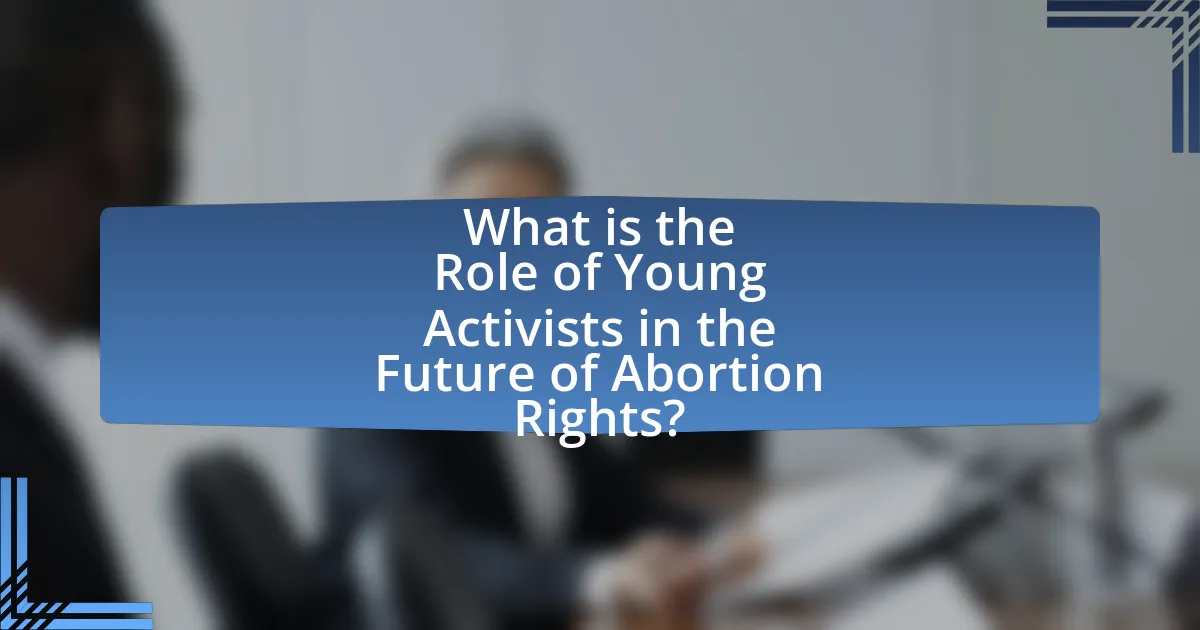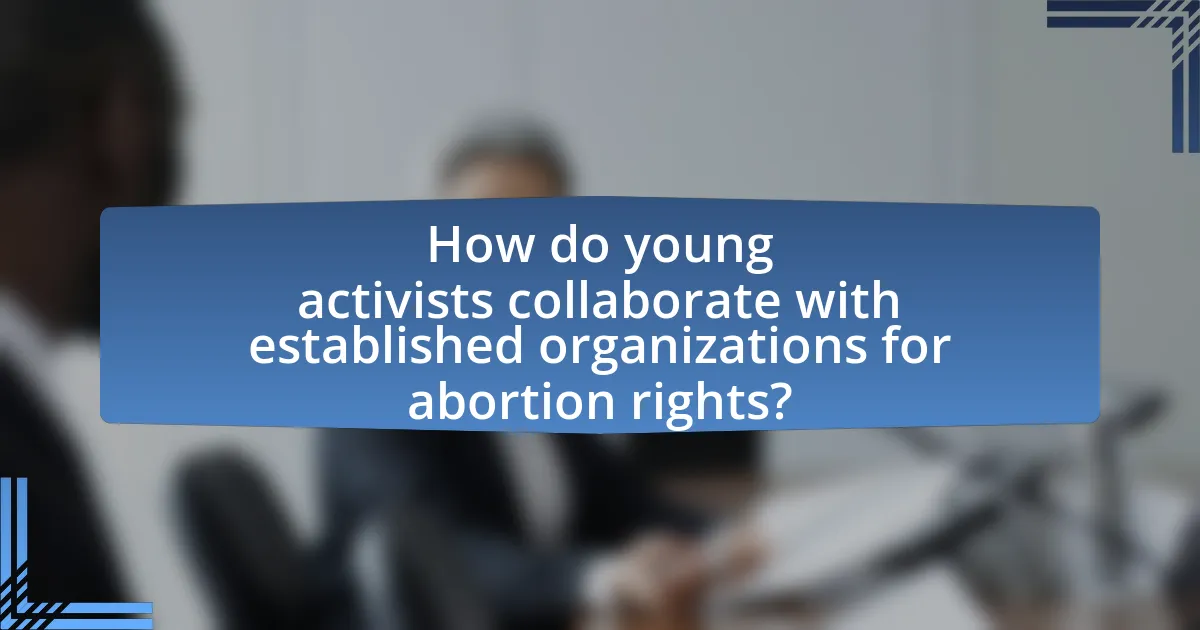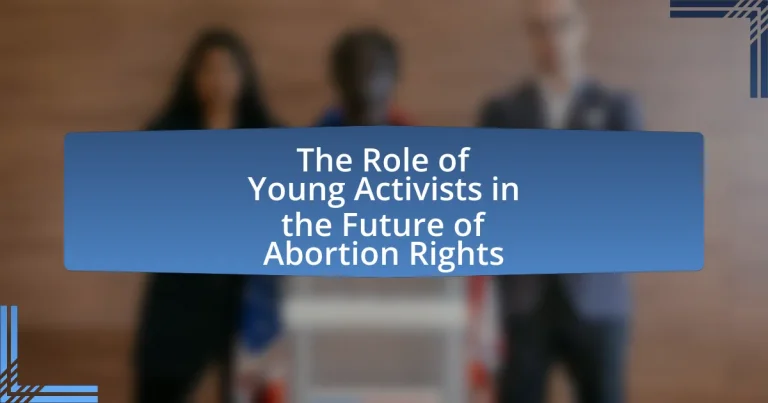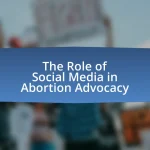The article examines the pivotal role of young activists in shaping the future of abortion rights. It highlights how their mobilization efforts, particularly through social media, have influenced public opinion and policy changes, especially following significant events like the 2022 protests against the overturning of Roe v. Wade. The piece discusses various strategies employed by these activists, including grassroots organizing and coalition-building, while also addressing the challenges they face, such as legal restrictions and societal stigma. Furthermore, it explores the importance of collaboration with established organizations and the potential long-term impacts of youth engagement on reproductive rights legislation and societal attitudes.

What is the Role of Young Activists in the Future of Abortion Rights?
Young activists play a crucial role in shaping the future of abortion rights by mobilizing public opinion, advocating for policy changes, and utilizing social media to raise awareness. Their engagement has been pivotal in recent movements, such as the 2022 protests following the overturning of Roe v. Wade, where young people organized rallies and campaigns that significantly influenced the national conversation on reproductive rights. Research indicates that younger generations prioritize reproductive rights, with 70% of voters aged 18-29 supporting the right to choose, according to a 2022 poll by the Pew Research Center. This demographic’s activism not only drives legislative efforts but also fosters a culture of advocacy that can lead to sustained changes in public policy and societal attitudes towards abortion.
How are young activists influencing the current abortion rights movement?
Young activists are significantly influencing the current abortion rights movement by leveraging social media to mobilize support and raise awareness. Their ability to quickly disseminate information and organize protests has led to increased visibility for abortion rights issues, particularly among younger demographics. For instance, the rise of platforms like TikTok has allowed activists to share personal stories and educational content, reaching millions and fostering a sense of community. Additionally, young activists are often at the forefront of campaigns that challenge restrictive laws, exemplified by the involvement of groups like Gen Z for Change, which has successfully lobbied for legislative changes in various states. This generational engagement not only amplifies the voices of those directly affected by abortion policies but also encourages broader societal discussions about reproductive rights, making the movement more inclusive and dynamic.
What strategies are young activists using to advocate for abortion rights?
Young activists are employing a variety of strategies to advocate for abortion rights, including grassroots organizing, social media campaigns, and coalition-building. Grassroots organizing involves mobilizing local communities to participate in rallies, protests, and educational events, which has been effective in raising awareness and fostering solidarity. Social media campaigns leverage platforms like Instagram and TikTok to disseminate information quickly, engage younger audiences, and counter misinformation about abortion. Coalition-building with other social justice movements enhances their reach and impact, as seen in collaborations with groups focused on racial justice and LGBTQ+ rights, thereby creating a more inclusive approach to advocacy. These strategies are supported by data indicating that youth-led movements have significantly influenced public opinion and policy discussions surrounding reproductive rights in recent years.
How do social media platforms amplify the voices of young activists?
Social media platforms amplify the voices of young activists by providing them with accessible tools to share their messages widely and engage with a global audience. These platforms enable young activists to create and disseminate content rapidly, allowing for real-time communication and mobilization around issues such as abortion rights. For instance, campaigns like #MeToo and #BlackLivesMatter have demonstrated how social media can facilitate grassroots movements, garnering millions of followers and significant media attention. Additionally, studies show that social media engagement can lead to increased participation in protests and advocacy efforts, highlighting its effectiveness in amplifying youth voices in social justice movements.
Why is the involvement of young activists crucial for the future of abortion rights?
The involvement of young activists is crucial for the future of abortion rights because they bring fresh perspectives, energy, and a strong commitment to social justice. Young activists are often more attuned to the values and concerns of their generation, which includes a significant emphasis on reproductive rights; for instance, a 2021 survey by the Pew Research Center indicated that 70% of young adults support legal abortion. Their engagement helps to mobilize grassroots movements, influence policy discussions, and challenge restrictive laws, as seen in recent protests and advocacy campaigns led by youth organizations. Furthermore, young activists utilize social media effectively to raise awareness and foster community support, amplifying their impact on public opinion and legislative action regarding abortion rights.
What unique perspectives do young activists bring to the abortion rights debate?
Young activists bring a fresh and dynamic perspective to the abortion rights debate by emphasizing intersectionality, digital advocacy, and a focus on reproductive justice. Their understanding of intersectionality highlights how race, gender, and socioeconomic status intersect to affect access to abortion services, advocating for policies that address these disparities. Additionally, young activists leverage digital platforms to mobilize support, share information, and organize protests, making the movement more accessible and inclusive. For instance, the rise of social media campaigns has significantly increased awareness and engagement among younger demographics, as seen in movements like #ShoutYourAbortion. This approach not only amplifies diverse voices but also fosters a sense of community and solidarity among supporters.
How does youth engagement impact legislative changes regarding abortion rights?
Youth engagement significantly influences legislative changes regarding abortion rights by mobilizing public opinion and advocating for policy reforms. Young activists often utilize social media platforms to raise awareness, organize protests, and lobby lawmakers, effectively amplifying their voices. For instance, the 2017 Women’s March, which saw a large participation of youth, highlighted the demand for reproductive rights and contributed to increased political discourse around abortion legislation. Research indicates that youth-led movements can sway legislative outcomes; a study by the Center for Information & Research on Civic Learning and Engagement found that young voters played a crucial role in the 2018 midterm elections, leading to a shift in congressional representation that favored pro-choice candidates. This demonstrates that youth engagement not only raises awareness but also translates into tangible legislative changes regarding abortion rights.
What challenges do young activists face in the fight for abortion rights?
Young activists face significant challenges in the fight for abortion rights, including legal restrictions, societal stigma, and limited access to resources. Legal restrictions vary by region, with many areas enacting laws that severely limit abortion access, making it difficult for activists to advocate effectively. Societal stigma surrounding abortion often leads to backlash against young activists, discouraging open dialogue and participation. Additionally, limited access to funding and organizational support hampers their ability to mobilize and sustain campaigns. According to a 2021 report by the Guttmacher Institute, 90% of U.S. counties lack an abortion provider, illustrating the geographical barriers young activists must navigate.
What are the main obstacles young activists encounter in their advocacy efforts?
Young activists encounter several main obstacles in their advocacy efforts, including lack of funding, limited access to decision-makers, and societal pushback. Funding is often scarce for youth-led initiatives, which can hinder their ability to organize events, conduct outreach, and sustain campaigns. Additionally, young activists frequently face challenges in gaining access to policymakers and influential stakeholders, which limits their ability to effect change. Societal pushback, including age-related biases and resistance from established groups, can further complicate their efforts, making it difficult for them to be taken seriously in discussions about abortion rights and other critical issues. These obstacles collectively impede the effectiveness of young activists in their advocacy work.
How do societal attitudes towards youth activism affect their efforts?
Societal attitudes towards youth activism significantly influence their efforts by either empowering or hindering their initiatives. Positive societal perceptions can lead to increased support, resources, and collaboration opportunities for young activists, as seen in movements like the March for Our Lives, which gained substantial traction due to favorable public sentiment. Conversely, negative attitudes can result in skepticism, dismissal, or even hostility towards their causes, limiting their impact and outreach. Research indicates that when society views youth activism as legitimate and valuable, young activists are more likely to mobilize effectively and achieve their goals, as evidenced by the success of climate strikes led by youth, which garnered widespread media attention and public support.

How do young activists collaborate with established organizations for abortion rights?
Young activists collaborate with established organizations for abortion rights by engaging in joint campaigns, sharing resources, and leveraging social media to amplify their messages. This collaboration often involves young activists participating in strategy meetings, organizing events, and mobilizing grassroots support, which enhances the reach and impact of established organizations. For instance, organizations like Planned Parenthood have partnered with youth-led groups to create initiatives that resonate with younger demographics, thereby increasing advocacy efforts. Research indicates that such collaborations can lead to a more dynamic and inclusive movement, as young activists bring fresh perspectives and innovative approaches to traditional advocacy methods.
What partnerships are being formed between young activists and larger organizations?
Young activists are forming partnerships with larger organizations such as Planned Parenthood and the American Civil Liberties Union (ACLU) to advance abortion rights. These collaborations leverage the grassroots mobilization skills of young activists alongside the established resources and networks of larger organizations. For instance, initiatives like the “Youth for Abortion Access” campaign, which includes partnerships with these organizations, aim to engage younger demographics in advocacy efforts, highlighting the importance of youth voices in shaping reproductive rights policies.
How do these collaborations enhance the effectiveness of abortion rights campaigns?
Collaborations enhance the effectiveness of abortion rights campaigns by pooling resources, expertise, and networks from diverse organizations. This collective approach allows for a broader reach and more impactful messaging, as seen in campaigns like the Women’s March, which united various groups to amplify their voices and increase visibility. Additionally, partnerships can leverage data and research to inform strategies, as demonstrated by the collaboration between reproductive health organizations and academic institutions, leading to evidence-based advocacy that resonates with policymakers and the public.
What resources do established organizations provide to support young activists?
Established organizations provide various resources to support young activists, including funding, training programs, mentorship opportunities, and access to networks. For instance, organizations like Planned Parenthood and the American Civil Liberties Union offer grants and scholarships specifically aimed at youth-led initiatives. Additionally, they conduct workshops and training sessions that equip young activists with skills in advocacy, public speaking, and grassroots organizing. Mentorship programs connect young activists with experienced leaders in the field, fostering guidance and support. Furthermore, these organizations often facilitate networking opportunities, allowing young activists to collaborate and share strategies with peers and established advocates, thereby enhancing their impact in the fight for abortion rights.
How can young activists leverage existing networks to promote abortion rights?
Young activists can leverage existing networks by collaborating with established organizations that advocate for abortion rights, such as Planned Parenthood and the National Abortion Federation. These organizations have extensive resources, outreach capabilities, and a history of successful advocacy, which can amplify the efforts of young activists. For instance, young activists can participate in campaigns, utilize social media platforms to share information, and engage in community events organized by these networks. Research shows that collective action within established frameworks increases the effectiveness of advocacy efforts, as seen in the 2017 Women’s March, which mobilized millions and highlighted reproductive rights issues. By tapping into these networks, young activists can enhance their visibility and impact in promoting abortion rights.
What role do mentorship and guidance play in empowering young activists?
Mentorship and guidance are crucial in empowering young activists by providing them with the knowledge, skills, and confidence needed to effect change. Experienced mentors can share strategic insights and practical advice, helping young activists navigate complex social and political landscapes. For instance, studies show that mentorship increases the likelihood of sustained engagement in activism, as it fosters a sense of belonging and purpose. Additionally, mentorship programs have been linked to higher rates of successful advocacy outcomes, as they equip young activists with essential tools and networks. This support system not only enhances individual capabilities but also strengthens collective movements, making mentorship a vital component in the fight for abortion rights and other social issues.
How can young activists utilize community resources to strengthen their initiatives?
Young activists can utilize community resources by forming partnerships with local organizations, accessing funding opportunities, and leveraging volunteer networks to enhance their initiatives. Collaborating with established groups allows activists to tap into existing expertise and resources, such as training programs and advocacy tools. For instance, organizations like Planned Parenthood often provide educational materials and support for grassroots campaigns, which can significantly amplify the reach and impact of young activists’ efforts. Additionally, seeking grants from community foundations or local government can provide necessary financial backing, enabling the execution of larger projects. Engaging volunteers from the community not only increases manpower but also fosters a sense of collective ownership and commitment to the cause, which is crucial for sustaining momentum in advocacy efforts related to abortion rights.
What are the future implications of young activists’ involvement in abortion rights?
Young activists’ involvement in abortion rights is likely to lead to significant shifts in policy and public perception. Their engagement has already demonstrated the ability to mobilize large groups, as seen in the 2022 protests following the overturning of Roe v. Wade, where youth-led organizations played a crucial role in advocating for reproductive rights. This demographic’s use of social media amplifies their messages, reaching wider audiences and influencing political discourse. Additionally, studies indicate that younger generations prioritize reproductive rights, suggesting that as they become more politically active, they will push for more progressive policies. This trend is supported by data from the Pew Research Center, which shows that 61% of millennials and Gen Z support legal abortion in most cases. Therefore, the future implications of their involvement could include more robust legal protections for abortion rights and a cultural shift towards viewing reproductive health as a fundamental right.
How might the landscape of abortion rights change due to young activists’ efforts?
Young activists’ efforts are likely to significantly reshape the landscape of abortion rights by mobilizing public opinion and influencing policy changes. Their engagement in grassroots campaigns, social media advocacy, and educational initiatives has already demonstrated the ability to raise awareness and galvanize support for reproductive rights. For instance, the March for Our Lives movement, which was initiated by young activists, has successfully highlighted the intersectionality of various social issues, including reproductive rights, thereby fostering a broader coalition for change. Additionally, surveys indicate that younger generations prioritize reproductive rights, with 70% of individuals aged 18-29 supporting legal access to abortion, suggesting that their activism could lead to more progressive legislation and a shift in societal norms surrounding abortion.
What potential long-term impacts could arise from increased youth activism?
Increased youth activism could lead to significant long-term impacts on social and political landscapes, particularly in areas like abortion rights. This activism often results in heightened awareness and engagement among younger generations, which can shift public opinion and influence policy decisions. For instance, studies have shown that youth-led movements, such as those advocating for reproductive rights, can mobilize large numbers of supporters and create pressure on lawmakers to consider progressive reforms. Historical examples include the impact of youth activism during the 1970s, which contributed to the legalization of abortion in several countries. Additionally, increased youth participation in activism fosters a culture of civic engagement, encouraging future generations to advocate for their rights and the rights of others, thereby sustaining momentum for social change.
How can young activists ensure sustainability in their advocacy for abortion rights?
Young activists can ensure sustainability in their advocacy for abortion rights by building coalitions with diverse organizations and engaging in continuous education on reproductive health issues. Collaborative efforts amplify voices and resources, creating a stronger impact. For instance, studies show that movements with broad coalitions are more effective in achieving policy changes, as seen in the success of the Women’s March, which united various groups to advocate for reproductive rights. Additionally, ongoing education helps activists stay informed about legal changes and public sentiment, allowing them to adapt strategies effectively.
What practical steps can young activists take to enhance their impact on abortion rights?
Young activists can enhance their impact on abortion rights by organizing grassroots campaigns that raise awareness and mobilize community support. These campaigns can include educational workshops, social media outreach, and partnerships with local organizations to inform the public about reproductive rights and the importance of access to safe abortion services. For instance, according to a 2021 report by the Guttmacher Institute, states with active grassroots movements have seen increased public support for abortion rights, demonstrating the effectiveness of community engagement. Additionally, young activists can advocate for policy changes by contacting legislators, participating in rallies, and utilizing platforms like Change.org to gather signatures for petitions that support reproductive rights legislation. Engaging in these practical steps not only amplifies their voices but also contributes to a broader movement for abortion rights.
What skills should young activists develop to be more effective in their advocacy?
Young activists should develop skills in communication, organization, and critical thinking to be more effective in their advocacy. Effective communication enables activists to articulate their messages clearly and persuasively, which is essential for mobilizing support and raising awareness about abortion rights. Organizational skills help activists plan and execute campaigns efficiently, ensuring that resources are utilized effectively and goals are met. Critical thinking allows activists to analyze complex issues, evaluate different perspectives, and develop informed strategies to address challenges in the fight for abortion rights. These skills are supported by research indicating that successful advocacy often hinges on the ability to convey messages effectively, coordinate efforts, and adapt to changing circumstances in the political landscape.
How can young activists engage their peers to foster a broader movement for abortion rights?
Young activists can engage their peers to foster a broader movement for abortion rights by utilizing social media platforms to raise awareness and share personal stories. Research indicates that 70% of young people are influenced by social media in their views on social issues, making it a powerful tool for mobilization. By creating compelling content that resonates with their peers, such as videos, infographics, and testimonials, activists can effectively communicate the importance of abortion rights and encourage discussions. Additionally, organizing local events, such as workshops and rallies, can provide opportunities for peer engagement and community building, further amplifying their message.


